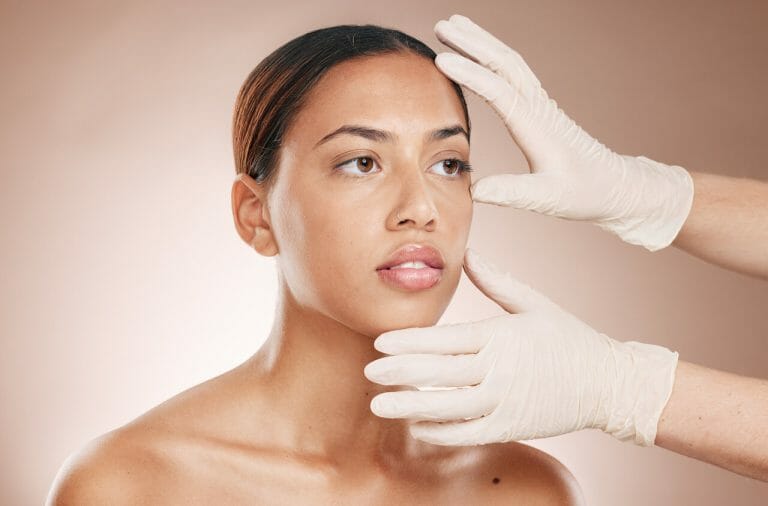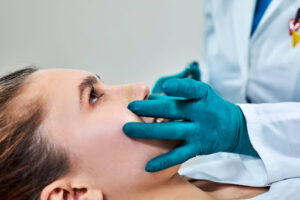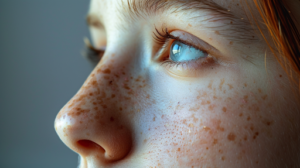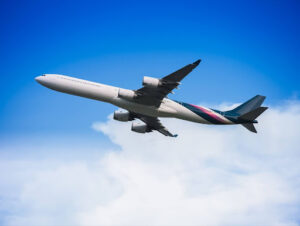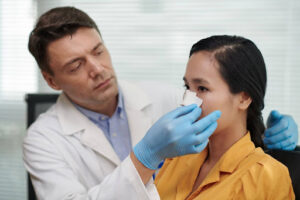Rhinoplasty is one of the most popular plastic surgery procedures. This type of surgery involves making changes to the bone, cartilage, skin, or other tissues in order to change the shape and size of the nose. Depending on the complexity of the procedure and each individual’s unique healing process, recovery times may vary greatly. While some people may experience full results within weeks after their procedure, others may take months before they experience all of the benefits associated with rhinoplasty.
In addition to providing information about how long it takes to recover from rhinoplasty, this article explains the factors that affect recovery time and shares tips to help speed up the healing process. By understanding more about what goes into recovering successfully after rhinoplasty, individuals can better plan and prepare for their procedure.
What Is Rhinoplasty?
Commonly referred to as a nose job, rhinoplasty is one of the most well-known cosmetic surgery procedures available today. This type of procedure can be used to correct congenital issues in some cases. As with any surgical procedure, there is a recovery period involved when it comes to rhinoplasty.
The day after your surgery, you will experience facial swelling which should subside within a year weeks but could take longer depending on your specific case. During this time, plenty of rest is recommended for optimal healing results. Avoiding excessive physical activity during this period is important too.
The nasal skin may take up to twelve months before it returns to its original form post-surgery due to bruising and swelling. However, these effects will steadily decrease over time. It’s important for patients to understand that recovery from rhinoplasty takes time and patience. Follow-up visits with their surgeon are essential so that progress can be monitored throughout the entire process.
Pre-Surgery Preparation
Preparation for a rhinoplasty procedure begins with an initial consultation with your doctor. During this meeting, the doctor will determine if you’re healthy enough to undergo nose job surgery as an outpatient or if you should be admitted to a hospital. Together, you will discuss any risks and potential complications associated with nasal surgery.
Your surgeon will explain what kind of results to expect from the nose job surgery, how long it might take for full recovery, and how much swelling can be expected after nasal surgery. They may require that you take certain blood tests prior to rhinoplasty surgery to ensure proper blood clotting and flow. This will reduce the risk of infection during the healing process. It is essential to follow the physician’s instructions carefully before and after rhinoplasty so that swelling can heal properly. This will ensure a successful outcome and reduce the chances of post-operative problems such as excess nasal swelling or pain following rhinoplasty.
Post-Surgery Period
During the post-surgery period of rhinoplasty, it’s essential for patients to follow their head and neck surgeon practicing in facial plastic surgery’s advice closely and practice proper care in order to get back to full health as soon as possible. While the actual nose job recovery time varies from patient to patient, it typically requires about a week off of school or work before being socially presentable.
Following your doctor’s orders strictly can help speed up recovery time significantly. Likewise, resting and eating properly can go a long way towards assisting the natural healing process of rhinoplasty patients following surgery. It’s also crucial for patients to pay close attention to their body’s reactions during the healing process.
During the first days after the surgery, it is recommended to take caution when doing everyday activities and avoid exercise or heavy lifting. This helps minimize discomfort while allowing blood vessels and incisions to heal properly. Patients may also be advised to apply cold compresses, use lubricants like Vaseline on areas that are prone to dryness, take pain medications if needed, avoid sun exposure, and wear sunscreen whenever outdoors. It’s vital that all instructions are followed precisely in order to ensure a safe rhinoplasty recovery period.
How Long Should I Take Off Work After Rhinoplasty?
When considering a rhinoplasty, it’s important to factor in the recovery time. While every patient is different and has their own individual needs for healing, most patients will need at least one week before returning to work or school. For those who have physically demanding jobs, two weeks may be necessary.
You’ll likely experience swelling and bruising around your eyes for up to a week after surgery. During this period, light activity such as walking is allowed but moderate exercise like jogging should be avoided until three or four weeks after surgery. Strenuous physical activity should not be undertaken until four months after surgery so as not to interfere with proper healing. However, if you’re recovering well during this period, gentle activities can be introduced gradually during the third month after surgery.
How much is rhinoplasty in Canada?
How Long Does It Take To Recover From Nose Surgery?
Total recovery from rhinoplasty can take several months. As with any kind of medical treatment plan, the amount of time it takes to heal and recover varies depending on different factors.
Here are key points about recovering from nose surgery:
- The day after your surgery, you may experience some pain, swelling, and congestion around your nasal passages. Your doctor might prescribe medications to help reduce inflammation and provide relief.
- You’ll need plenty of rest while healing. Aim for at least 8 hours of sleep each night if possible. After the first week or two post-surgery, most patients report feeling more comfortable and less restricted when they do activities such as walking or light exercise.
- It’s normal to experience bruising and numbness around your face for a couple of months following rhinoplasty. While this typically fades over time, it could cause facial balance issues until fully healed.
- While not everyone experiences discomfort associated during rhinoplasty recovery, some people find it quite painful. If this occurs, talk with your doctor about ways to manage the pain better and be sure to ask questions if anything seems off!
- It may take anywhere from 3-4 weeks until you regain the ability to handle your daily life comfortably. During this time frame, it’s essential that you follow all instructions given by your surgeon closely!
Understanding what to expect during rhinoplasty recovery helps ensure that you have an optimal outcome. Taking care of yourself both physically and mentally prior to and post-procedure is key. Speak up if anything feels wrong or doesn’t seem right!
Swelling And Bruising
Swelling after rhinoplasty is common and can last a couple of weeks. You will however be socially presentable after one week. The amount of swelling may vary depending on factors like how much tissue was removed or altered, as well as your individual healing abilities. It’s not unusual for asymmetrical healing during the postoperative period. This could mean one side heals quicker than the other or there is less swelling in certain areas than others. Moreover, blood from clotting is normal and usually subsides within two days after surgery.
Your head and neck surgeon practicing in facial plastic surgery can provide additional guidance throughout this process if needed. Additionally, a visit back to their office after surgery may be required so they can assess your progress and make sure everything looks good. The time needed for full recovery from rhinoplasty depends on individual factors such as age, genetics, and lifestyle habits. However, most patients find that their results become fully apparent within 3-6 months following treatment. It’s important to take care of yourself and be patient as you heal so that you can enjoy more beautiful results.
Nasal Splint Removal
Removal of a nasal splint is an important part of rhinoplasty surgery and typically occurs about five to seven days after a closed rhinoplasty approach. Before splint removal, patients may experience some issues with breathing as well as tenderness or pain around their nose. To minimize discomfort and aid healing, doctors often recommend using saline nasal spray or other medications to reduce inflammation and congestion.
Follow-Up Appointments
Follow-up appointments allow your doctor to assess how you’re healing and make sure that swelling in nasal tissues has gone down sufficiently. Furthermore, they can answer any questions you have about the plastic surgery recovery timeline and provide tips on how to manage post-operative medical conditions.
Your doctor may recommend using a travel pillow when sleeping, placing cold compresses around your nose, avoiding strenuous activities, and limiting sun exposure for a month after your surgery. Additionally, it’s important to go to your follow-up appointments to monitor progress throughout the entire recovery period.
Care During Recovery
Here are some things you can do to make sure your nose heals properly after rhinoplasty:
- It’s important not to disrupt nasal passages or soft tissues with strenuous activities or vigorous exercise;
- Avoid hot showers. Instead, take lukewarm ones;
- Eating healthy food is also essential for the body to heal itself quickly and efficiently;
- Drinking plenty of hydrating fluids can help prevent dehydration while recovering;
- Make sure you get enough rest by using extra pillows if needed. This will limit swelling and discomfort around the surgical area and improve blood circulation;
- Don’t forget about relaxation techniques like yoga or meditation. These are great to relieve the stress associated with recovery.
How Painful Is Rhinoplasty Recovery?
While the procedure itself often causes only minimal discomfort due to anesthetic use, recovery from rhinoplasty can be uncomfortable for some patients. It’s important to note that following instructions provided by your doctor regarding care during recovery will minimize any potential discomfort or pain related to the procedure.
The goals for surgery will determine whether there may be swelling, bruising, or tenderness after the operation. All of these factors could affect pain levels throughout recovery. For those who experience a significant amount of post-operative discomfort, prescription medications are available to help manage the symptoms.
Tips For A Successful Recovery
- When undergoing rhinoplasty surgery, it’s important to take proper care of yourself both before and after the procedure.
- While the majority of swelling should subside within the first few days, most of it may remain for several weeks afterward. To reduce swelling, try using cold compresses on your face throughout the day and taking anti-inflammatory medications prescribed by your doctor.
- Listen closely to instructions given by your surgeon regarding activity level restrictions. Certain types of cardiovascular activities should wait until all signs of inflammation have subsided completely.
- Attend follow-up appointments with your doctor so they can monitor your progress.
- If you wear prescription glasses, these may need to be adjusted after surgery due to swelling in the area around your eyes. In contrast, if you wear contact lenses, you should take them out 1 week prior to surgery and keep them out for 2 weeks afterward. This will give your eyes enough time to heal properly.
- It is beneficial to have someone available who can assist you following surgery if needed.
Book A Rhinoplasty Consultation
If you are considering rhinoplasty, then you should book a consultation with a board-certified head and neck surgeon practicing in facial plastic surgery. At Face MD, we are here to help you achieve your aesthetic goals. We offer specialized cosmetic medical and surgical care exclusively for the face and neck in a clinic directed by the reputable Dr. Sami Moubayed.
We offer different types of rhinoplasty services:
- Rhinoplasty
- Revision rhinoplasty
- Ultrasonic rhinoplasty
- Ethnic rhinoplasty
- Middle eastern rhinoplasty
- Alar base reduction
- Non-surgical nose job
If you’re interested in learning more about this cosmetic surgery, contact us today!

